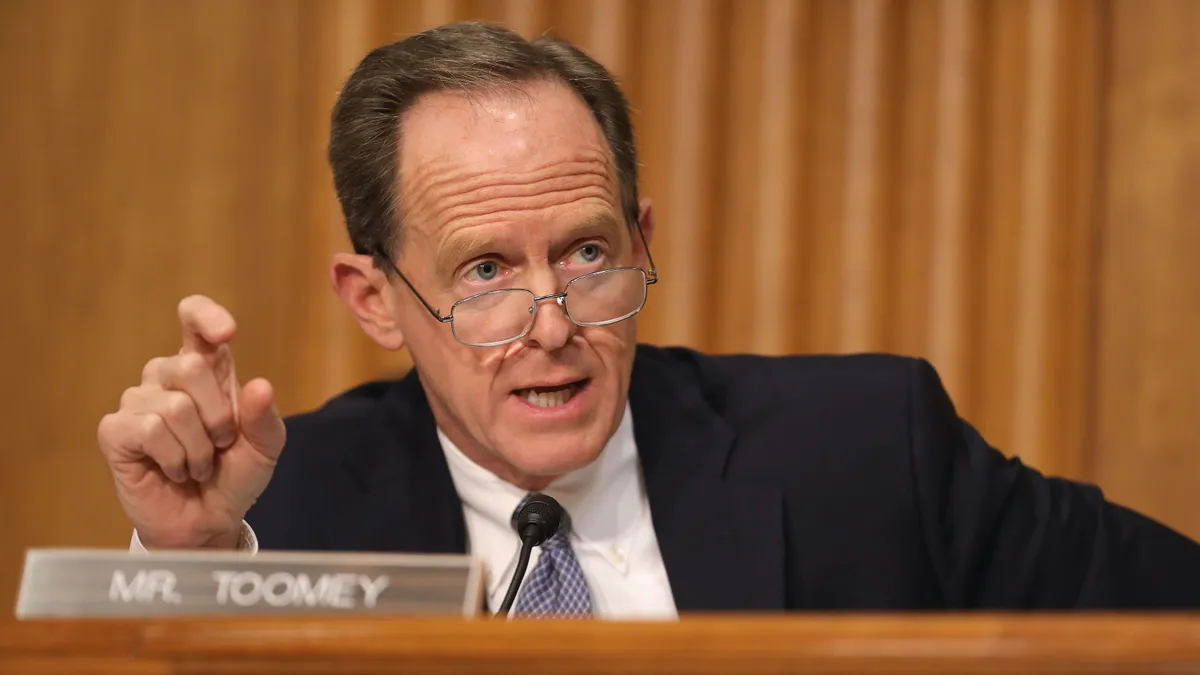Dive Brief:
- Sen. Pat Toomey, R-PA, is asking the Federal Deposit Insurance Corp. (FDIC) for more information surrounding whistle-blower accounts that the agency is discouraging banks from doing business with crypto companies, according to a letter he wrote Tuesday to the regulator’s acting chief, Martin Gruenberg.
- Toomey said his office had corroborated an allegation that employees in the FDIC’s Washington headquarters gave the agency’s regional offices draft letters to send to some banks requesting that they refrain from expanding their ties to crypto companies. The letters, however, don’t give a law-based reason for the request, Toomey said.
- Toomey’s letter comes roughly two weeks after the FDIC issued an advisory meant to clamp down on what the agency sees as risks of consumer confusion and harm stemming from crypto products offered through banks.
Dive Insight:
In his letter Tuesday, Toomey, the ranking member of the Senate Banking Committee, laid out two examples of behavior he inferred may overreach the boundaries of typical regulation.
In one, employees from FDIC’s headquarters questioned bank examiners from one of the agency’s regional offices over their review of a bank’s loan to a crypto-related company, and urged the examiners to downgrade their classification of the loan, Toomey said.
“It is my understanding that it is highly atypical for FDIC headquarters personnel to be involved in reviewing an individual loan,” Toomey wrote. “If reports are true that there was nothing unusual about this loan (other than that it was to a crypto-related company) and that the loan amount was too small to affect the bank’s supervisory rating even if it had to write off the entire loan, this episode raises important questions.”
In a second example, Toomey said a bank planned to give customers access to a crypto firm’s trading platform through the bank’s mobile app. Customers would have “received clear disclosures” that neither the crypto firm nor the digital assets are FDIC-insured, Toomey said.
“This arrangement appears similar to the common practice of banks partnering with third parties so customers can access services like stock trading platforms,” Toomey wrote Tuesday.
Crypto companies’ customer-facing disclosures — particularly surrounding deposit insurance — have come under scrutiny in recent months in the wake of Voyager Digital’s bankruptcy. The FDIC investigated Voyager’s disclosures last month and ordered the company to remove any false and misleading statements regarding deposit insurance from its website, mobile app, social media accounts, marketing, advertising and other text.
The FDIC’s actions were “necessary and appropriate,” an agency representative told American Banker and Law360, “given the risks readily apparent in the crypto-asset markets.”
"The FDIC is acting consistent with long-standing legal authorities to ensure that banks engaging in crypto-related activities are doing so in a safe and sound way that protects consumers," the representative said. "This may involve the FDIC requesting that an institution delay initiating or refrain from expanding crypto-related activities until supervisory feedback is taken into account.”
Toomey is asking Gruenberg to respond by Aug. 30 with details of any instance — since he became the FDIC’s acting chief — of headquarters staff instructing, requesting or suggesting that regional offices ask banks to refrain from doing business with crypto firms or sending letters to that effect.
Toomey also inferred he may have a paper trail — asking Gruenberg separately whether an FDIC official or employee sent communications or memos to regional offices to that effect “on or about June 6.”
“Given the FDIC’s involvement under your leadership in the Obama administration’s notorious Operation Choke Point, which sought to coerce banks into denying services to legal yet politically disfavored businesses, it is important to better understand the actions the FDIC is now taking and the legal basis for them,” Toomey wrote to Gruenberg, who also helmed the FDIC from 2011 to 2018.
Toomey asked Gruenberg whether the FDIC’s legal division has weighed in on the legality of asking banks to limit their relationships with crypto firms.
The FDIC in April told banks that are engaging in crypto activity — or planning to — to notify the agency. The Federal Reserve this week issued guidance to the banks it supervises, asking much the same.












